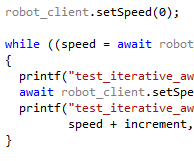CppCast Episode 37: Ranges with Eric Niebler
Episode 37 of CppCast the only podcast for C++ developers by C++ developers. In this episode Rob and Jason are joined by Eric Niebler to discuss his work on Ranges and the future of the Standard Library.
CppCast Episode 37: Ranges with Eric Niebler
by Rob Irving and Jason Turner
About the interviewee:
Eric Niebler is an independent consultant specializing in C++ library development. Currently, he is working on modernizing the C++ standard library and adding support for ranges, funded by the first-ever grant from the Standard C++ Foundation. Previously, Eric was a consultant for BoostPro computing, a member of Microsoft's Visual C++ team, and a Microsoft Researcher before that. In addition, he has several libraries in Boost and is a Boost release manager and steering committee member. Eric has been an active member of the C++ Standardization Committee for well over 10 years. He speaks regularly at C++ conferences around the world.
In a previous life, Eric drifted with no fixed address, writing C++ and blog entries from cafes and beaches around the world. Today, Eric is a family man living and working in the glorious Pacific Northwest near Seattle.

 Oracle Solaris Studio 12.5 Beta Release
Oracle Solaris Studio 12.5 Beta Release This article is considers lots of approaches to solving a concurrency problem, but of particular interest are the sections showing the power of the Concurrency TS
This article is considers lots of approaches to solving a concurrency problem, but of particular interest are the sections showing the power of the Concurrency TS  You can now easily verify if Clang can compile your code on Windows:
You can now easily verify if Clang can compile your code on Windows: